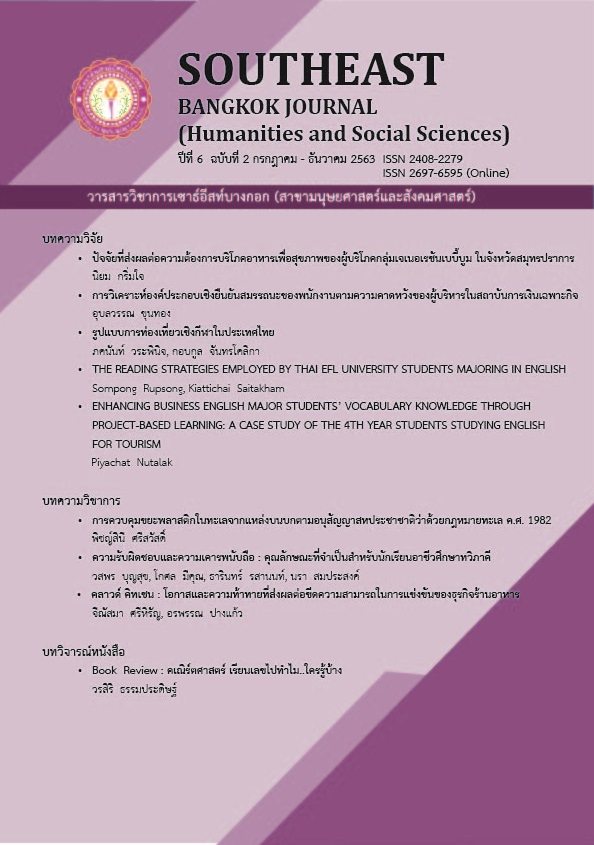THE READING STRATEGIES EMPLOYED BY THAI EFL UNIVERSITY STUDENTS MAJORING IN ENGLISH
Main Article Content
บทคัดย่อ
การวิจัยครั้งนี้ มีวัตถุประสงค์เพื่อศึกษากลวิธีในการอ่านของนักศึกษาชั้นปีที่ 1 สาขาวิชาภาษาอังกฤษ คณะครุศาสตร์และคณะมนุษยศาสตร์และสังคมศาสตร์ มหาวิทยาลัยราชภัฏเชียงใหม่ จำนวนทั้งสิ้น 212 คน เครื่องมือที่ใช้ในการเก็บข้อมูลคือแบบสอบถามกลวิธีการอ่าน (SORS) ซึ่งดัดแปลงมาจาก Mokhtari and Sheorey (2002) แบบสอบถามแบ่งออกเป็นสองตอน ตอนที่ 1 เป็นคำถามเกี่ยวกับข้อมูลทั่วไป ตอนที่ 2 เป็นการถามความถี่ในการใช้กลวิธีการอ่าน คําตอบเปนมาตรา สวนประมาณคาโดยใชมาตราวัดแบบลิเคิรท 5 ระดับ จากระดับ 1 ใช้น้อยที่สุดจนถึงระดับ 5 ใช้บ่อยที่สุด กลวิธีการอ่านในแบบสอบถามนี้แบ่งออกเป็น 3 กลุ่ม ได้แก่ กลวิธีการอ่านแบบ Global Reading Strategies กลวิธีการอ่านแบบ Problem Solving Strategies และ กลวิธีการอ่านแบบ Support Strategies ข้อมูลที่ได้นำมาวิเคราะห์โดยใช้ค่าความถี่ ร้อยละ และค่าเฉลี่ย ผลการวิจัยพบว่า กลวิธีการอ่านแบบ Problem Solving Strategies เป็นกลวิธีที่นักศึกษาใช้มากที่สุด รองลงมาคือ กลวิธี Support Strategies และ กลวิธีการอ่านแบบ Global Reading Strategies ผลการวิจัยยังแสดงให้เห็นว่านักศึกษาใช้กลวิธีการอ่านทั้งสามบ่อยครั้งในการอ่านภาษาอังกฤษ
Article Details
เอกสารอ้างอิง
Ahmadi, M. (2012). Reciprocal teaching strategies and their impacts on english reading comprehension. Theory and Practice in Language Studies, 2(10), 2053-2060.
Alsheikh, N. (2011). Three readers, Three languages, Three texts: The strategic reading of multilingual and multiliterate readers. The Reading Matrix, 11(1), 34-53.
Boonkongsaen, N. (2014). The effects of gender, reading anxiety and language learning experience on Thai science-oriented students’ use of reading strategies. International Forum of Teaching and Studies, 10(1), 24-35.
Chamot, A. U., & O’ Malley, J. M. (1994). The CALLA handbook: implementing the cognitive language learning approach. Reading, MA: Addison Wesley.
Cohen, A. D. (1998). Strategies in learning and using a second language. London: Longman.
Ilknur, Y., & Ismail, Y. (2012). Metacognitive awareness of academic reading strategies. Procedia Social and Behavioral Sciences, 31, 894-898.
Ilustre, C. A. (2011). Beliefs about reading, metacognitive reading strategies, and text comprehension among college students in a private university. Philippine ESL Journal, 7, 28-47.
Li, F. (2010). A study of english reading strategies used by senior middle school students. Asian Social Science, 6(10), 184-192.
Martinez, A. C. (2008). Analysis of ESP university students’ reading strategy awareness. IBERICA, 15, 165-176.
Mokhtari, K., & Reichard, C. (2004). Investigating the strategic reading processes of first and second language readers in two different cultural contexts. System, 32(3), 379-394.
Mokhtari, K., & Sheorey, R. (2002). Measuring ESL students’ awareness of reading Strategies. Journal of Developmental Education, 25(3), 2-10.
Oxford, R. (1990). Language learning strategies: What every teacher should know. Boston: Heinle & Heinle.
Saengpakdeejit, R. (2014). Thai third-year undergraduate students’ frequent use of reading strategies with a focus on reading proficiency and gender. Kasetsart Journal, 35(1), 103 – 112.
Sheorey, R., & Mokhtari, K. (2001). Differences in the metacognitive awareness of reading strategies among native and non-native readers. System, 29(4), 431-449.


